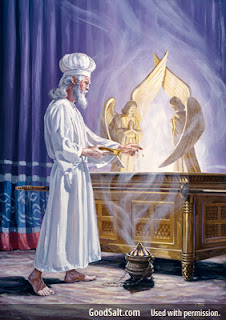"Behold, the days are coming, declares the LORD, when I will make a new covenant with the house of Israel and the house of Judah, not like the covenant that I made with their fathers on the day when I took them by the hand to bring them out of the land of Egypt, my covenant that they broke, though I was their husband, declares the LORD. For this is the covenant that I will make with the house of Israel after those days, declares the LORD:
We who live under the blessing and lordship of Jesus Christ see the promises of that new covenant fulfilled in our midst. What are those blessings? Let us add them up one by one.
- I will put my law within them, and I will write it on their hearts.
- And I will be their God, and they shall be my people.
- And no longer shall each one teach his neighbor and each his brother, saying, 'Know the LORD,' for they shall all know me, from the least of them to the greatest, declares the LORD. For I will forgive their iniquity, and I will remember their sin no more." - Jeremiah 31:31-34 ESV
- Our High Priest is seated at God's right hand (Hebrews 8:1). No longer does any priest have to kill animals, sprinkle blood or spread out sacrifices on an altar. That work was but an example of what was to come. The final sacrifice has been made. Our High Priest sits now at the Father's right hand, pleading for us on the basis of His one final sacrifice.
- Our High Priest ministers on our behalf in the true tent pitched by the LORD, not by man (Hebrews 8:2-3). His public ministry (ministry is our word liturgy) is to plead for mercy on our behalf. The basis for His plea is the fact that He has offered His life, shed His infinitely precious blood for us. All that previous priests could offer was the blood of animals. These sacrifices did not in truth pay for the debts we incur by our sinning. They could not. They were but shadows or examples and copies of what was to come (Hebrews 8:4-5).
- Our High Priest is our only Mediator (Hebrews 8:6). A mediator is one who intervenes between two. He is the go-between, the one who is able to restore peace and friendship between two parties. Moses previously was one such. He was the one who brought God's commands to the Children of Israel, the one who acted as their mediator with God. This is what Christ and Christ alone is for all men. Through Him we are privileged and able to come into the presence of God Himself. This is what the Apostle wrote in his letter to young pastor Timothy: "For there is one mediator between God and men, the man Christ Jesus." 1 Tim. 2:5 - ESV
There was no such High Priest in the Old Covenant. They had no such high priest in the heavenly places. All they had were earthly priests ministering in a tent or temple made with human hands, mere copies of the true heavenly temple. This was the fault or defect of the first covenant. The houses of Israel and Judah needed a new covenant.
But what exactly is a covenant? There are many examples of covenants in the Old Testament writings. For instance, Abraham made a covenant between himself and Abimelech the Philistine at Beersheba to settle the dispute between them about water. The oath between them was sealed by seven ewe lambs that Abraham gave to Abimelech. Therefore that place was called Beersheba (the well of seven in Hebrew) - Gen. 21:22-32.
Covenants were not always between equals, however. Yet they were binding and taken most seriously. So there was a covenant between the LORD God and the people of Israel, not a covenant between equals, but between the greater and the lesser, similar to the treaties imposed by a great king upon one of his vassal kings who owed him homage and obedience. Israel accepted such a covenant when she escaped slavery in Egypt. The people of Israel promised to have no other gods and to obey the LORD. The Mosaic law and the sacrificial system and all these entailed were part of that covenant. But Israel did not keep her covenant with the LORD. She broke it. She turned to other gods. She disobeyed God's laws. The old covenant was a failure.
In view of all this the prophet Jeremiah, as spokesman for the LORD, promised a new covenant. In this new covenant the LORD would write His law on the hearts of God's people, within them. They would truly know Him. And their sins and iniquities would be forgiven. We will explore next time what that implies for us who have put our faith and trust in Christ.

_by_Zurbar%25C3%25A1n,_San_Diego_Museum_of_Art.jpeg)
